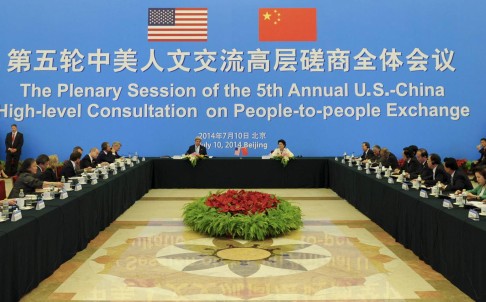Despite the positive gloss, talks in Beijing show mutual mistrust is deepening, observers say

For all their grand-sounding words, the gulf between the US and Chinese delegations last week was large, analysts say. Photo: Xinhua
China and the United States are finding it harder to accommodate each other, many observers believe, despite both nations putting a positive spin on the outcome of annual high-level talks.
Leaders from both sides used the talks to stress their determination to contain conflicts, and to highlight cooperation over economic, military and climate change issues. But political mistrust is worsening and new flashpoints could emerge easily, commentators warn.
"The talks ended with officials presenting their stances on critical issues but without convincing each other about their strategic intentions," said Sun Zhe, the director of the Centre for US-China Relations at Tsinghua University. "Neither side can present evidence that can change the mind of the other side."
Sun said it was unlikely frictions would escalate into a major confrontation, but mistrust was expected to deepen given the intention of the US to bolster its military alliances in Asia. Beijing would continue to strengthen economic cooperation with the US, but was prepared for a "struggle" against Washington.
"It is very difficult for the two nations to become partners in the aspect of strategic security," Sun said, adding the South China Sea was a potential flashpoint as both sides stepped up involvement in Southeast Asia. "Both nations are now at a point where they need to reset their ties."
Officials from both sides stressed neither power had the intention of containing or challenging the other. In his opening speech, President Xi Jinping warned of disastrous consequences if the nations could not manage frictions. US Secretary of State John Kerry said the US was not a rival to China.
The officials said they reached consensus on several issues such as North Korea's nuclear programme. The two militaries would also establish a notification mechanism, and discuss rules of behaviour covering military and maritime affairs.
Yue Gang, a Beijing-based military affairs commentator, said the notification mechanism and rules were aimed at preventing major confrontations.
The mechanism will probably include alerts about the timing and location of military exercises, as encounters between the two sides have become more frequent with China flexing its navy's muscle.
"China is expanding its influence, and the power of the established nation will be offset in the process," Yue said. "[Neither nation has a] proper understanding of the core concerns of the other side. The situation could improve if both sides saw the development of the other as an opportunity instead of a threat."
Although China stressed it had no plan to exclude the US in the Asia-Pacific region, Washington was concerned that Beijing was building a security structure based on an "Asia for the Asians" concept, according to a transcript on the State Department website.
On territorial disputes with its neighbours, Kerry urged Beijing to show restraint, while China's chief diplomat, State Councillor Yang Jiechi , said the US should take a "just" position.
Graham Webster, a Beijing-based senior fellow at the China Centre at Yale Law School, said both countries had compelling reasons to resolve their differences. "The US and China have far more common interests than conflicting ones. Both countries need a peaceful Asia-Pacific region and a stable world economy if they want to thrive."
He said there was a looming risk of escalation if the two nations failed to develop confidence over cybersecurity.
The joint cybersecurity working group was suspended following the US indictment of five Chinese military officers for hacking into US companies. "A crisis of [large] scale is unlikely in the short term, but without real effort, it could become a real risk in coming years," Webster said.
http://www.scmp.com/news/china/article/1552973/mistrust-between-china-and-us-getting-worse-analysts-say

No comments:
Post a Comment
Note: Only a member of this blog may post a comment.